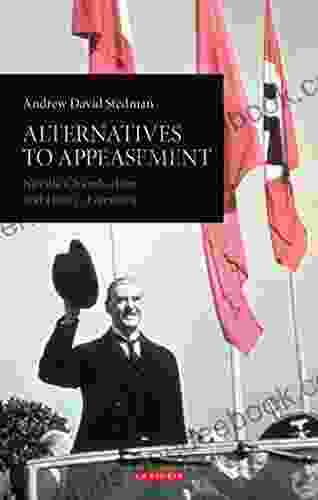Neville Chamberlain and Nazi Germany: A Comprehensive Examination of Their Relationship and the Munich Agreement

The relationship between Neville Chamberlain, Prime Minister of the United Kingdom, and Nazi Germany under Adolf Hitler is a fascinating and complex chapter in world history. It was a relationship marked by both diplomacy and tension, and ultimately led to the outbreak of World War II. In this article, we will examine the lead-up to the war, the Munich Agreement, and the role that Chamberlain played in both.
4.5 out of 5
| Language | : | English |
| File size | : | 3160 KB |
| Text-to-Speech | : | Enabled |
| Enhanced typesetting | : | Enabled |
| Word Wise | : | Enabled |
| Print length | : | 320 pages |
| Screen Reader | : | Supported |
Chamberlain's Rise to Power and Foreign Policy
Neville Chamberlain was born in Birmingham, England, in 1869. He entered politics in 1918 and served in various ministerial positions before becoming Prime Minister in 1937. Chamberlain was a Conservative who believed in the principles of free trade and international cooperation. He was also a strong advocate of appeasement, the policy of making concessions to aggressive powers in order to avoid war.
Chamberlain's foreign policy was shaped by his belief that the Treaty of Versailles, which had been imposed on Germany after World War I, was too harsh. He believed that the treaty had created economic and political instability in Germany, and that this had contributed to the rise of Hitler and the Nazi Party. Chamberlain hoped that by appeasing Hitler, he could prevent another war and create a more stable Europe.
The Munich Agreement
In 1938, Hitler began to make demands for the Sudetenland, a region of Czechoslovakia that was home to a large German-speaking population. Chamberlain, along with French Prime Minister Édouard Daladier, met with Hitler in Munich, Germany, to discuss the issue. At the Munich Conference, Chamberlain agreed to cede the Sudetenland to Germany in exchange for Hitler's promise that he would make no further territorial demands.
The Munich Agreement was a major diplomatic triumph for Chamberlain. He returned to England a hero, and the British people believed that he had averted war. However, the agreement was also a major turning point in European history. It showed that Hitler was willing to use force to achieve his goals, and it emboldened him to make further demands.
The Outbreak of World War II
In March 1939, Hitler violated the Munich Agreement by invading the rest of Czechoslovakia. Chamberlain responded by declaring war on Germany on September 3, 1939. World War II had begun.
Chamberlain's policy of appeasement has been widely criticized. Many historians believe that it only emboldened Hitler and made war more likely. However, it is important to remember that Chamberlain was acting in what he believed were the best interests of his country. He genuinely believed that appeasement could prevent war, and he was unwilling to risk the lives of British soldiers unless it was absolutely necessary.
Chamberlain's Legacy
Chamberlain died in office in 1940. He is a controversial figure in British history. Some historians believe that he was a weak and indecisive leader who made a series of disastrous mistakes. Others believe that he was a principled man who was trying to do what he thought was right.
Regardless of one's opinion of Chamberlain, there is no doubt that he played a major role in the events leading up to World War II. His policy of appeasement was a failure, but it is important to understand the reasons why he adopted it. Chamberlain was a complex and contradictory figure, and his legacy will continue to be debated for many years to come.
The relationship between Neville Chamberlain and Nazi Germany was a complex and fateful one. Chamberlain's policy of appeasement was a failure, but it is important to understand the reasons why he adopted it. Chamberlain was a complex and contradictory figure, and his legacy will continue to be debated for many years to come.
Bibliography
- Butler, R. A. (1963). The memoirs of the Rt Hon R.A. Butler, Lord Butler of Saffron Walden: The years of apprenticeship. London: Cassell.
- Chamberlain, N. (1938). Speech to the House of Commons, October 1938. Read online
- Gilbert, M. (1991). Winston S. Churchill. Vol. 5, The Prophet of Truth: 1922-1939. London: Heinemann.
- Kennedy, P. (1989). The rise and fall of the great powers: Economic change and military conflict from 1500 to 2000. New York: Random House.
- Lucas, R. (1966). The decline and fall of the British Empire. London: Macmillan.
- Macmillan, H. (1967). The memoirs of Harold Macmillan, 1st Earl of Stockton. Vol. 1, Winds of change, 1914-1957. London: Macmillan.
4.5 out of 5
| Language | : | English |
| File size | : | 3160 KB |
| Text-to-Speech | : | Enabled |
| Enhanced typesetting | : | Enabled |
| Word Wise | : | Enabled |
| Print length | : | 320 pages |
| Screen Reader | : | Supported |
Do you want to contribute by writing guest posts on this blog?
Please contact us and send us a resume of previous articles that you have written.
 Book
Book Page
Page Story
Story Reader
Reader Library
Library Paperback
Paperback Magazine
Magazine Newspaper
Newspaper Sentence
Sentence Bookmark
Bookmark Glossary
Glossary Bibliography
Bibliography Preface
Preface Annotation
Annotation Footnote
Footnote Bestseller
Bestseller Library card
Library card Narrative
Narrative Biography
Biography Memoir
Memoir Reference
Reference Encyclopedia
Encyclopedia Thesaurus
Thesaurus Librarian
Librarian Catalog
Catalog Card Catalog
Card Catalog Stacks
Stacks Archives
Archives Study
Study Scholarly
Scholarly Lending
Lending Reserve
Reserve Academic
Academic Rare Books
Rare Books Interlibrary
Interlibrary Literacy
Literacy Study Group
Study Group Storytelling
Storytelling Reading List
Reading List Textbooks
Textbooks Codex Regius
Codex Regius Mindy J Allport Settle
Mindy J Allport Settle D B Lawhon
D B Lawhon Gudrun Heyens
Gudrun Heyens Alex Crowley
Alex Crowley Justin Brooke
Justin Brooke Harold Bell Wright
Harold Bell Wright Karen Hesse
Karen Hesse Corinne Michaela Flick
Corinne Michaela Flick Dr Ruth K Westheimer
Dr Ruth K Westheimer D Robert Pease
D Robert Pease Khaled Hosseini
Khaled Hosseini David A White
David A White Franklin Kendrick
Franklin Kendrick Wendell Minor
Wendell Minor Robert Marsh
Robert Marsh Shelley Noble
Shelley Noble Steven Johnson
Steven Johnson Edward D Mansfield
Edward D Mansfield Nicole Baart
Nicole Baart
Light bulbAdvertise smarter! Our strategic ad space ensures maximum exposure. Reserve your spot today!
 Wade CoxFollow ·18.9k
Wade CoxFollow ·18.9k Xavier BellFollow ·5.9k
Xavier BellFollow ·5.9k Reginald CoxFollow ·14.5k
Reginald CoxFollow ·14.5k Finn CoxFollow ·9.7k
Finn CoxFollow ·9.7k Chase SimmonsFollow ·13.5k
Chase SimmonsFollow ·13.5k Craig CarterFollow ·10.4k
Craig CarterFollow ·10.4k Gus HayesFollow ·18.8k
Gus HayesFollow ·18.8k Tyrone PowellFollow ·18.8k
Tyrone PowellFollow ·18.8k

 Anton Chekhov
Anton ChekhovClarinet Fundamentals: A Systematic Fingering Course for...
Welcome to the exciting world of...

 Gage Hayes
Gage HayesSea Prayer: A Haunting and Heartbreaking Story of...
Sea Prayer, the latest...

 Henry Green
Henry GreenPillars of Society Rosmersholm Little Eyolf When We Dead...
Henrik Ibsen, the towering...

 Robert Reed
Robert Reed10 For 10 Sheet Music Classical Piano Favorites: A...
Learning to play the...
4.5 out of 5
| Language | : | English |
| File size | : | 3160 KB |
| Text-to-Speech | : | Enabled |
| Enhanced typesetting | : | Enabled |
| Word Wise | : | Enabled |
| Print length | : | 320 pages |
| Screen Reader | : | Supported |















